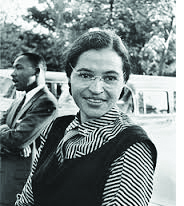March 2015 Monthly Letter
Dear Reconciler Family,
 I had a wonderful Black History Month Celebration! It’s been great reviewing some of the magnificent contributions that African Americans have made, and continue to make in this country. Something that is often overlooked or neglected in school books, films and other media.
I had a wonderful Black History Month Celebration! It’s been great reviewing some of the magnificent contributions that African Americans have made, and continue to make in this country. Something that is often overlooked or neglected in school books, films and other media.
It’s always astounding to me to review these many magnificent contributions and pass them on to the next generation. I think that’s very important not just for African Americans but for all Americans. It’s our history.
My wife Jannice and I had the privilege of visiting the Glendora, California Congregation where I spoke on the topic of Black History Month. I gave a brief summary of the life of an African American man named Lanier Phillips. I wrote about him in my February 2013 ORM Letter. You may want to review it. It’s on my ORM website at ORM.org.
It’s the story of his experience in the U.S. Navy during World War II, when he and 5 other Black Soldiers served on the ship named the USS TUXTON. It was segregated so they slept in the lower deck where they cooked, ate, and served the White officers, and also cleaned their laundry.
During the heat of the war against the Germans in the raging waters in Newfoundland, the USS TUXTON wrecked. The ship crashed into rugged rocks. And although segregation was rampant even in the military, the people of Newfoundland helped to pull the crew out of the freezing water. Lanier survived. He was attended to by a White nurse who helped nurse him back to good health.

Rosa Parks quietly refused to give up her seat on a segregated Montgomery City bus. This led to positive changes in the law.
Despite it all, Lanier ended up making great achievements because he refused to give up. A more comprehensive rendition on Lanier is on the ORM website mentioned above.
I asked one African American friend, and elder, “What does Black History Month mean to you?” He wrote the following: “To me, Black History means more than a discussion about a few exceptional black individuals. It addresses the fact that an entire race has lived through millennia with beliefs, struggles, accomplishments and survival, with high-points and low-points, experiencing personal and societal downfall from various obstacles including the commercial slave trade. It tells me that God brought this people to the present time, as he did other people, through great trials by various sources and resources, including their faith in his mighty purposes and acts, so that they may overcome and reconcile differences. Black History shouts to me, ‘Don’t live me, neither ignore me, nor fail to learn from all I have to teach.’”
I received this response from a White parishioner after speaking at a Black History Month Celebration in Glendora, California, and sharing some of my personal experiences: “Whenever the speaker has personal experiences to share it makes the topic so much more interesting and memorable. I’m sorry for what you went through as a child but thankful as you said, that all those experiences have brought you to this point, of leading a reconciliation ministry.”
Sincerely,

